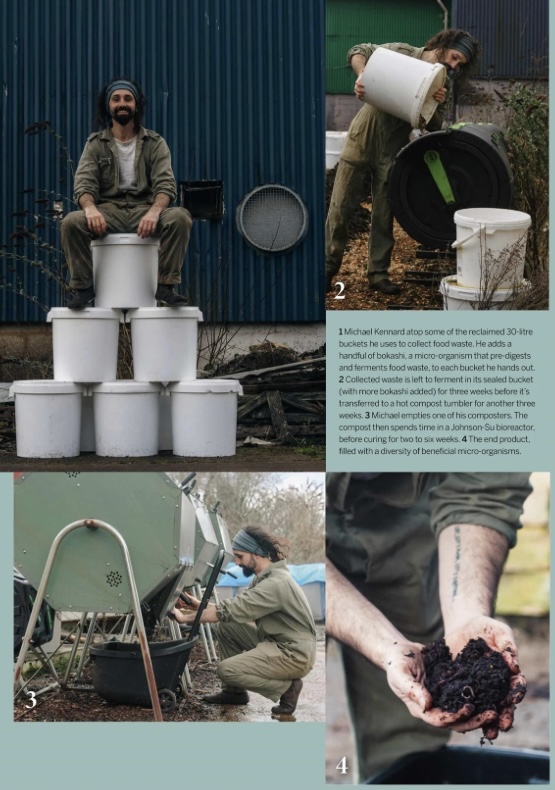It’s been a year since we interviewed Michael Kennard of Compost Club about how Maze Compost Tumblers were helping him with his work. As this week is Compost Week UK, what better time to catch up with this wannabe earthworm, who is on a mission to get us all saving our soil.
Compost Club has gone from strength to strength in the past year and Michael shows no sign of slowing down. He is interviewed in this month’s edition of Gardens Illustrated, recently featured in House and Garden and is also due to give a talk at Gardeners’ World Live at Birmingham NEC in June.

If you haven’t heard of Compost Club before, this is how the scheme – a social enterprise based in Lewes, East Sussex – works: Michael collects members’ food waste every three weeks in his electric van and returns nutrient-rich compost for their garden in the spring. The surplus goes into community gardening projects and is also available to buy.
But this is not just any common or garden compost. Michael has studied the subject, learning from American pioneers such as the microbiologist Elaine Ingham and the molecular biologist Dr David C Johnson. The compost he produces is teeming with biological life; perfect for improving soil structure and making nutrients available to plants to ensure healthy growth.
Great Green Systems bought some of the club’s surplus compost last spring and can vouch for the fact that this really is ‘black gold’, top-notch compost.

Michael came up with the idea for Compost Club when he discovered he needed much more compost than he could produce from his own green waste to feed his no-dig allotment.
He started asking people for input and was soon being offered more than he could use on the allotment.
‘People were asking me to take their food waste, because Brighton & Hove Council doesn’t collect it. In the UK, millions of tons of food waste still go into landfill. For every ton of that, there are over 600kg of carbon equivalent emissions – methane, nitrous oxide and all those nasties. If we compost that waste aerobically, the figure goes down to 8kg, which is virtually nothing. So that’s my incentive to do more.
‘Composting is about maximising the diversity of beneficial micro-organisms,’ he explains. ‘They do all the work. I’m just facilitating the process, creating the conditions for the naturally occurring life.’
He currently collects from 180 homes and hopes to set up similar schemes in the area by training other people to compost in the same way. He is also looking to set up a community-based composting system at Great Dixter House and Gardens, near Rye, as well as working with Human Nature, an eco-driven development company who are planning a carbon-neutral neighbourhood in Lewes.
Nutrient cycling
‘My vision is to start Compost Clubs within some of the most densely populated city areas,’ says Michael. ‘The excess compost can go out to the farms, so they can grow naturally pest- and disease-resistant plants that don’t need biocides. The nutrient density will come back to our food again, we’ll all be healthier and there’s a beautiful synchronicity of nutrient recycling that just makes complete sense.’
He is still a fan of his 245 litre Maze Compost Tumblers: ‘I find in-vessel composters like these to be ideal to be able to compost all your food waste in a timely fashion, without concern about rodents and also to produce a really good quality of compost after a good maturation process.’
In Gardens Illustrated (see photo) Michael is shown sitting on top of some of the reclaimed 30 litre buckets he uses to collect food waste. He adds a handful of bokashi, a micro-organism that pre-digests and ferments food waste, to each bucket he hands out. Collected waste is left to ferment in its sealed bucket (with more bokashi added) for three weeks before it’s transferred to a Compost Tumbler for another three weeks mixed 50:50 with woodchips supplied by local tree surgeons. The compost then spends time in a Johnson-Su bioreactor, before curing for two to six weeks.
He says that he used to think the best we could do for the planet was to be ‘the least bad’. Then he dived into the world of permaculture, regenerative growing and soil health. Now he sees sustainability as a minimum requirement for any business. ‘We can actually make things better if we live well,’ he says.
Michael’s on a mission to change the way people see waste and introduce them to a natural nutrient cycle whereby their food waste becomes compost, which helps them grow more food, which becomes more food waste. And so the cycle continues. ‘Waste is a human idea, and it’s a terrible idea.’
He started learning about the soil food web and bought himself a microscope.
‘I found that although the commercial compost is made of organic matter, it’s basically sterile – there’s nothing living in there. That’s the case across the board. ‘
He realised that to get the quality he was after, he would have to start making his own compost, although as he points out, he doesn’t actually make it – ‘I just create the conditions that allow the micro-organisms to do their work.’
His work energises him and has fostered a sense of what he calls ‘joyful service.’ He’s particularly keen to spend more time running workshops to spread the Compost Club ethos of healthy soil, healthy plants, healthy people.
Saving the planet
‘By empowering individuals and communities to make compost for themselves, I can have a bigger reach.’
Michael’s recent appearance in House and Garden was part of a series by Clare Foster about people passionate about saving the planet.
He talks about how soil is the foundation of our health and, if we destroy it, it’s to our own detriment. Improved soil structure also means soil can absorb more water from rainfall to mitigate flooding.
‘Healthy soil will filter water, whereas soils that haven’t had organic matter added are insubstantial and the topsoil just gets washed away. As a planet, we’re losing topsoil at an alarming rate – some people say we only have 50 or 60 harvests left if we carry on as we are.
‘Everything is a reflection of the soil. If the plants have that natural cycle going on, they’re really healthy. When we eat those plants, that’s what informs our gut health.’
As Michael says, healthy soil, healthy plants, healthy humans. It makes perfect sense.

